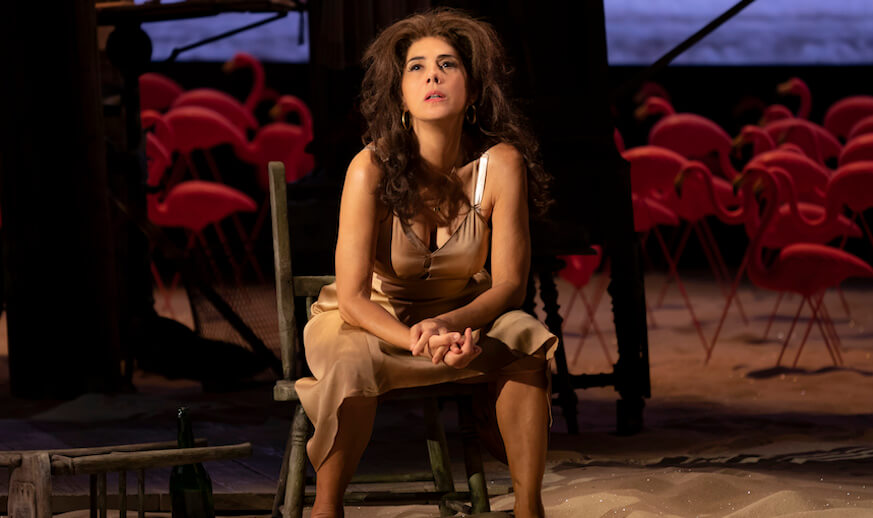Tennessee Williams’s “The Rose Tattoo” is not one of his best known plays, but Sicilian powerhouse Serafina Delle Rose may be one of his greatest characters.
Roundabout’s production, directed by Trip Cullman and running at the American Airlines Theatre through Dec. 8, reflects this truth: not the greatest play I’ve ever seen, but Marisa Tomei gives one of the fiercest performances I’ve ever witnessed. And, because she appears in essentially every scene, the production is a triumph.
What I really want to talk about is the lawn flamingo, the tacky but harmless ornament from suburban lawns of yore, invented in 1957 by Don Featherstone. Lawn flamingos represent the ultimate duality: superfluous, pink and inherently feminine, but simultaneously made of tough plastic, built to survive the brutal elements of the outdoors. They, like Serafina Delle Rose, are stronger than you give them credit for. Pink plastic lawn flamingos litter the stage of “The Rose Tattoo,” set in the year 1950 (seven years before the flamingos were invented). Before they were permanently discontinued in 2006, the plastic birds were traditionally sold in pairs: one with its head bent down, the other looking straight ahead. We see both birds posed onstage, and they’re a metaphor for our heroine. It’s reductive to pigeonhole (flamingohole? Sorry…) Serafina into just one of these positions, as they represent her duality: she who sees and she who refuses to.
In Act One, Serafina is the first flamingo, head buried in the sand. The play opens on a sultry, happy Serafina, waiting for her beloved husband to come home from delivering bananas (and the drugs that lie beneath them) in his ten-ton truck. He never comes home that night, and the show skips forward to three years after his death: Serafina’s daughter Rosa (played by Ella Rubin) is now 15, graduating from high school and experiencing her first love with a sailor named Jack (the wide-eyed Burke Swanson, who holds his own with Tomei in a very funny scene with a skeptical Serafina). Rubin, herself a senior in high school, beautifully navigates Rosa’s adolescent frustration with and fierce protection of her mother. Meanwhile, three years deep in her mourning, Serafina has essentially let herself go (although a single mother who runs a business in 1950 after her drug-peddling husband gets himself killed seems quite capable to this reviewer). What’s holding Serafina back is her continued worship of her late husband, particularly her obsession with their physical attraction and his body (she’s particularly fixated on his chest tattoo of a rose). Metaphorically, her head is buried in the sand like the first flamingo, and she refuses to rejoin the world or acknowledge the truth of her husband’s secrets, which begin to reveal themselves during Act One.
Act Two sees Serafina as the forward-looking flamingo #2, no longer able to hide from the truth and finally both free and forced to see the world around her. She sits outdoors for the first time, where we are introduced to Alvaro Mangiacavallo (played by the funny, charming Emun Elliott), a passing banana truck driver. Their courtship is simultaneously timid and tired, as they are both adults who know what they want and are too old for games but can’t help but play them anyway. It contrasts beautifully to the desperate, naive romance between Rosa and Jack.
Watching Marisa Tomei navigate love, devastation, mourning, shock, anger, attraction and lust (to name a small sample) without skipping a beat is miraculous. Even though this review compares her to a lawn flamingo (it’s a *metaphor,* okay?), the woman is anything but plastic. She is one of the most alive actors I have ever witnessed, pulsing with pent-up energy dying to be released. “The Rose Tattoo” is an opportunity to see one of Tennessee Williams’s less-produced shows with one of today’s finest living actors. I’d recommend it.

















